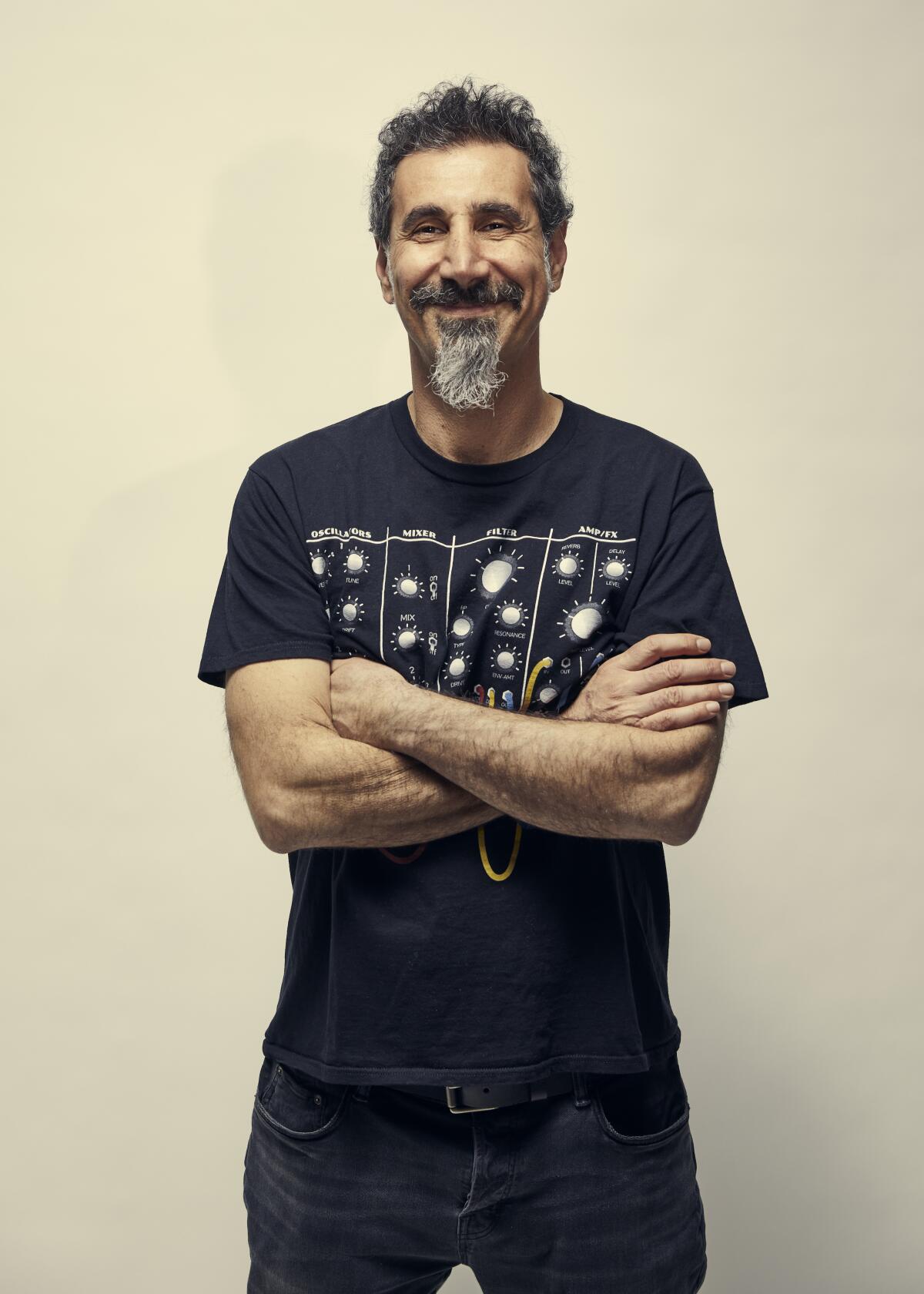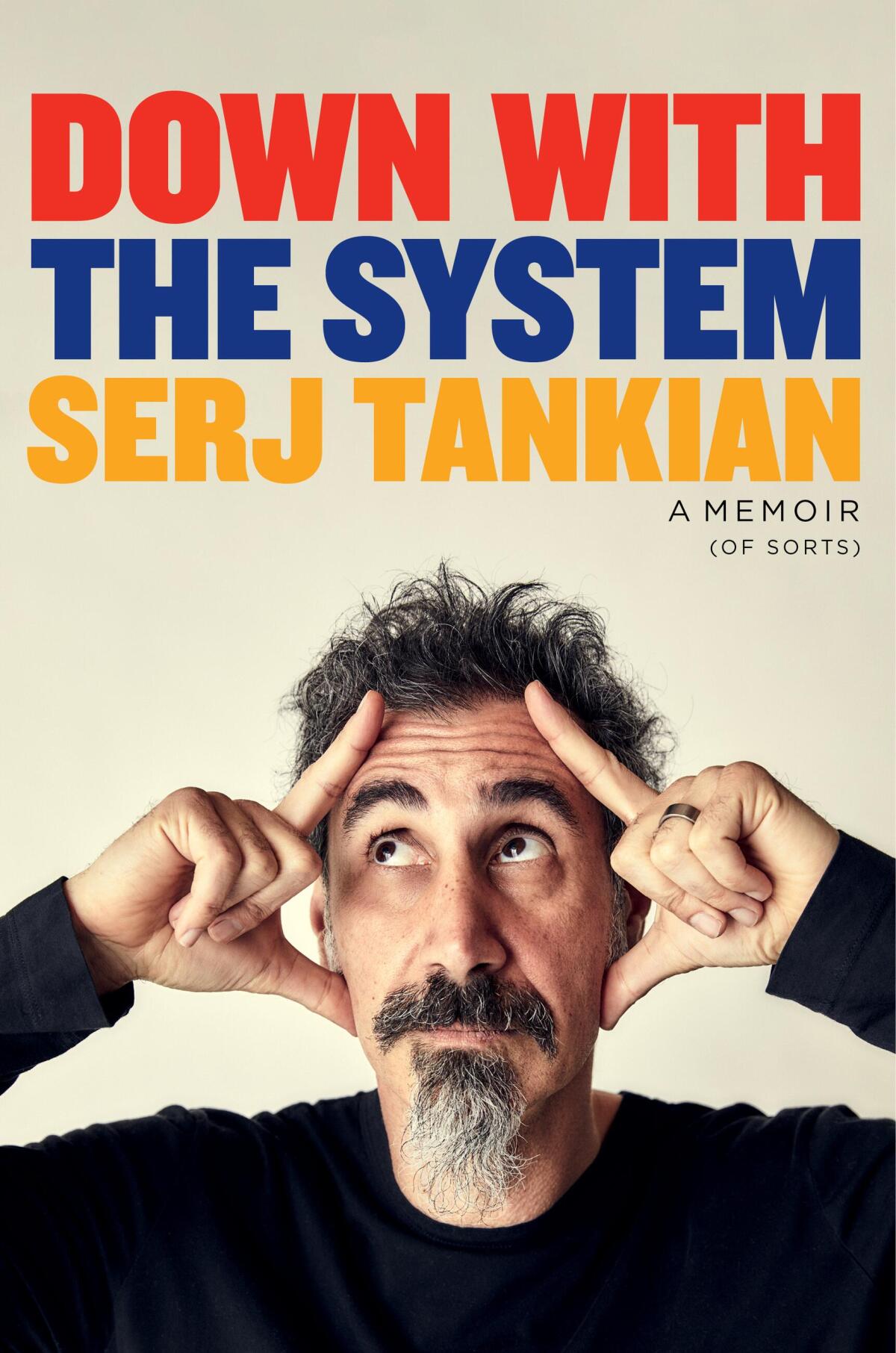System of a Down singer Serj Tankian’s new book details band’s up and downs, and what fuels his activism

On the Shelf
Down With the System
By Serj Tankian
Hachette: 352 pages, $30
If you buy books linked on our site, The Times may earn a commission from Bookshop.org, whose fees support independent bookstores.
Serj Tankian is a man of many talents. Aside from being the lead singer of rock band System of a Down, he’s also a solo artist, composer, filmmaker and painter. This month he can add author to that list, as his memoir “Down With the System” comes out May 14.
Born in Beirut to Armenian parents, Tankian and his family moved to Los Angeles when he was 7. His multiplatinum-selling band System of a Down is composed of four men of Armenian ancestry who grew up in L.A. Though it’s been almost 20 years since the band’s last album “Hypnotize” came out in 2005, their influence in rock remains undeniable. Recently the band was tapped to headline a show at Golden Gate Park accompanied by the Deftones, the Mars Volta, Viagra Boys and Vows on August 17.
“Down With the System” starts with Tankian, a longtime champion of Armenian causes, being grilled by Howard Stern in 2001 for an essay he wrote called “Understanding Oil,” which he posted on the band’s website in the days after 9/11. He called 9/11 “a reaction to existing injustices around the world, generally unseen to most Americans.” With America reeling from the attacks, the essay sparked considerable controversy. Stern told listeners how Tankian “said the right things” on the show, and Tankian calls it a missed opportunity to speak his mind on American foreign policy.
He vowed to never let that happen again.
Ever outspoken, Tankian spoke with The Times about his book, why he’s optimistic about Armenia, and whether we might see another album from System of a Down.

What compelled you to take on a memoir?
I had a call from a literary agent in London, who asked if I’d be interested in a memoir. My first answer was, not really. I want to write a book about the intersection of justice and spirituality [laughs], a philosophy book, and ultimately we realized that both can be done in the same form. So it became a memoir of sorts.
Are you able to be optimistic about what’s going on in Armenia?
I’m an eternal optimist because I have to be, based on my culture. We’ve had such a tragic history that without optimism, you wouldn’t get out of bed. The reason that I’m optimistic is, Armenia has a very strong, growing economy right now — in fact, one of the strongest in all of Europe, in terms of GDP growth. The 2018 Velvet Revolution, the peaceful revolution, really pivoted the country into a more transparent, responsible governance. It changed a lot of things and slowly got rid of all the post-Soviet corrupt policies. The problem was in 2020, when Azerbaijan, along with the help of Turkey, attacked Nagorno-Karabakh and Armenia. It led to basically a brain drain, and the death of 5,000 men — like a whole generation of young men.
For those that don’t know much about what’s going on in Armenia, can you point them toward a fact-based website, a book, a film?
There’s a wonderful English news website from Armenia called Civil Net [civilnet.am] that they can check out. The U.S.’s own Radio Free Armenia is also a resource.

I know it’s a question you get every day, but will there be another System of a Down record?
Time will tell! I go into a lot of nitty-gritty details with the process of understanding each other and laying out what everyone’s vision is, at least what my vision is for the band, and to move forward. I’m proud to say that, in 2020, we were able to galvanize and do two songs [“Protect the Land” and “Genocidal Humanoidz”] that we dedicated to our people in Nagorno-Karabakh and Armenia and to raise awareness and funds for those people suffering.
Any concern about how your bandmates might interpret some of what you’ve shared in the book?
Sure, sure. I was very honest because that’s who I am. I’m an activist, and without being honest, there’s no activism. But at the same time, I have compassion and love for the guys. I have respect for the guys. One of them is my brother-in-law! We’re a family. We’ve been together for 30 years. The reason I even wanted to write it was, some of it’s already public, but not really perceived correctly. I wanted to put it to bed so we can move beyond this.
Is there a live performance of yours that sticks out in your mind a little bit more than the rest?
I would say [System’s] show in 2015 in Yerevan, Armenia. It was the 100th commemoration of the Armenian genocide in Republic Square and it was streamed worldwide, so we had millions of people watching. It felt like the top of the mountain for the band, like we had achieved something greater than music. It was being with our people, our heritage, where we come from, and playing for them and for our ancestors and our grandparents who were survivors of the genocide. It was a feeling unparalleled.
More to Read
Sign up for our Book Club newsletter
Get the latest news, events and more from the Los Angeles Times Book Club, and help us get L.A. reading and talking.
You may occasionally receive promotional content from the Los Angeles Times.








